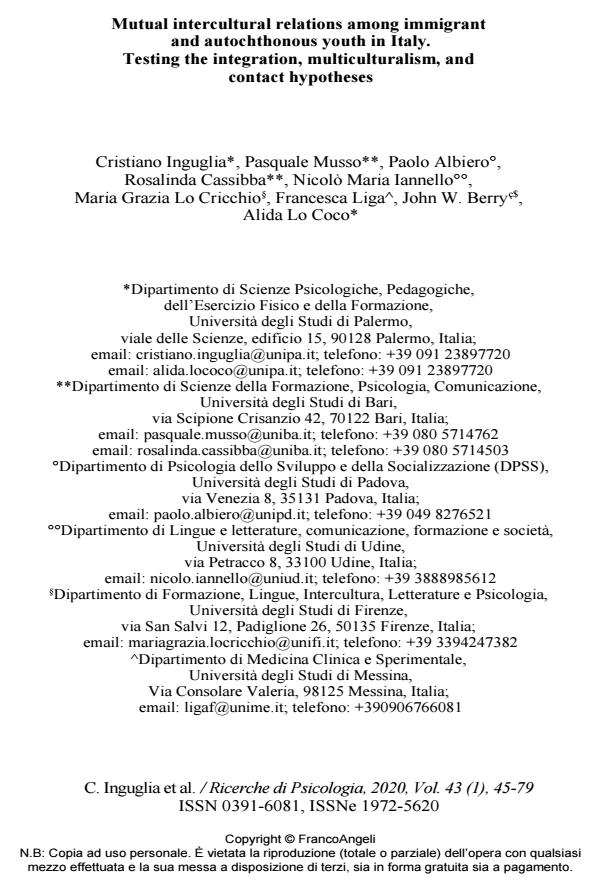Mutual intercultural relations among immigrant and autochthonous youth in Italy. Testing the integration, multiculturalism, and contact hypotheses
Titolo Rivista RICERCHE DI PSICOLOGIA
Autori/Curatori Cristiano Inguglia, Pasquale Musso, Paolo Albiero, Rosalinda Cassibba, Nicolò Maria Iannello, Maria Grazia Lo Cricchio, Francesca Liga, John W. Berry, Alida Lo Coco
Anno di pubblicazione 2020 Fascicolo 2020/1
Lingua Inglese Numero pagine 35 P. 45-79 Dimensione file 315 KB
DOI 10.3280/RIP2020-001004
Il DOI è il codice a barre della proprietà intellettuale: per saperne di più
clicca qui
Qui sotto puoi vedere in anteprima la prima pagina di questo articolo.
Se questo articolo ti interessa, lo puoi acquistare (e scaricare in formato pdf) seguendo le facili indicazioni per acquistare il download credit. Acquista Download Credits per scaricare questo Articolo in formato PDF

FrancoAngeli è membro della Publishers International Linking Association, Inc (PILA)associazione indipendente e non profit per facilitare (attraverso i servizi tecnologici implementati da CrossRef.org) l’accesso degli studiosi ai contenuti digitali nelle pubblicazioni professionali e scientifiche
Italy is increasingly becoming a culturally complex society. This poses numerous challenges for developmental and educational psychology, mainly in terms of how to encourage adequate levels of social harmony by promoting positive development of both immigrant and autochthonous youth. Within this perspective, the current paper presents the Italian findings of the Mutual Intercultural Relations in Plural Societies (MIRIPS) international project, postulating the centrality of three core hypotheses: integration, multiculturalism, and contact. Two studies were performed to investigate these hypotheses. Study 1 comprised 188 Tunisian adolescents aged 13-18 (51% F; Mage=15.94), while Study 2 included 282 Italian adolescents aged 13-18 (58% F; Mage=16.34). Data collection involved completion of the Italian version of the MIRIPS questionnaires, including security, contact, attitudes, acculturation, and well-being measures. In both studies, hypotheses were simultaneously tested by a SEM approach. The tested theoretical models fit the data well. For Tunisian adolescents, establishing contacts with Italian peers was associated with acculturation outcomes of integration (contact hypothesis), that, in turn, were related to higher well-being (integration hypothesis). Also, higher levels of perceived discrimination were related to acculturation outcomes of separation (multiculturalism hypothesis). For Italian adolescents, feelings of security were linked to higher multicultural ideology and tolerance (multiculturalism hypothesis) as well as to higher contact with immigrants, that, in turn, were connected to lower segregationist attitudes (contact hypothesis). Moreover, higher levels of acculturation expectation of multiculturalism (the idea that nondominant/ immigrant groups should be integrated by both maintaining the original culture and adopting the dominant/hosting culture) were linked to higher self-esteem (integration hypothesis). The findings substantially supported the three core hypotheses and provided insights for decision-makers and practitioners to design effective social policies and educational programs to enhance the quality of intercultural relations among youth in Italy.
Parole chiave:Integration, multiculturalism, contact, intercultural relations, immigration, acculturation.
- Interethnic workplace conflict: Reciprocal perception of Italian and immigrant blue-collar coworkers Maria Grazia Monaci, in Europe’s Journal of Psychology /2022 pp.193
DOI: 10.5964/ejop.2395 - More similarity if different, more difference if similar: Assimilation, colorblindness, multiculturalism, polyculturalism, and generalized and specific negative intergroup bias Anastasia Batkhina, John W. Berry, Tomas Jurcik, Dmitrii Dubrov, Dmitry Grigoryev, in Europe’s Journal of Psychology /2022 pp.369
DOI: 10.5964/ejop.3715 - Intercultural Relations Among Guinean Immigrants Living in Portugal: Testing Multiculturalism, Contact, and Integration Hypotheses Félix Neto, in Journal of Ethnic and Cultural Studies /2021 pp.225
DOI: 10.29333/ejecs/641 - Migrazioni e psicologie. Introduzione al Forum Alessandro Antonietti, Antonella Marchetti, in RICERCHE DI PSICOLOGIA 1/2020 pp.13
DOI: 10.3280/RIP2020-001002 - Acculturation and adaptation of international students at Portuguese universities Joana Neto, Félix Neto, in Applied Psychology Research /2025 pp.3028
DOI: 10.59400/apr3028 - Intercultural relations among Filipino immigrants living in Macau Long Sui, in International Journal of Intercultural Relations 102015/2024 pp.102015
DOI: 10.1016/j.ijintrel.2024.102015 - Social Anxiety and Bullying Victimization in Children and Early Adolescents: The Role of Developmental Period and Immigrant Status Nicolò Maria Iannello, Simona Caravita, Noemi Papotti, Carmen Gelati, Marina Camodeca, in Journal of Youth and Adolescence /2024 pp.130
DOI: 10.1007/s10964-023-01865-9 - “Causality crisis” in acculturation research a false alarm?: A commentary on Kunst (2021) Dmitry Grigoryev, John W. Berry, in International Journal of Intercultural Relations /2022 pp.158
DOI: 10.1016/j.ijintrel.2021.12.003 - Correlates of Acculturation Strategies: Personality, Coping, and Outcome Paul G. Schmitz, Florian Schmitz, in Journal of Cross-Cultural Psychology /2022 pp.875
DOI: 10.1177/00220221221109939 - Acculturation, adaptation, and loneliness among Cape Verdean immigrants Joana Neto, Cirenia Quintana-Orts, Félix Neto, in International Journal of Intercultural Relations /2022 pp.98
DOI: 10.1016/j.ijintrel.2022.01.013 - Japanese people's attitudes toward acculturation and intercultural relations Joonha Park, John W. Berry, Mohsen Joshanloo, in Journal of Pacific Rim Psychology 18344909221090996/2022
DOI: 10.1177/18344909221090996 - Majority members’ acculturation: How proximal-acculturation relates to expectations of immigrants and intergroup ideologies over time Katharina Lefringhausen, Tara C. Marshall, Nelli Ferenczi, Hanna Zagefka, Jonas R. Kunst, in Group Processes & Intergroup Relations /2023 pp.953
DOI: 10.1177/13684302221096324 - Blindspots in acculturation research: An agenda for studying majority culture change Hanna Zagefka, Katharina Lefringhausen, Lucía López Rodríguez, Ana Urbiola, Nali Moftizadeh, Alexandra Vázquez, in European Review of Social Psychology /2023 pp.127
DOI: 10.1080/10463283.2022.2079813 - Contextual and Individual-Personal Factors of the Psychological Adaptation of the Ethnic Majority in Estonia and Kyrgyzstan Anastasiia V. Trifonova, Nadezhda M. Lebedeva, in RUDN Journal of Psychology and Pedagogics /2024 pp.466
DOI: 10.22363/2313-1683-2024-21-2-466-489
Cristiano Inguglia, Pasquale Musso, Paolo Albiero, Rosalinda Cassibba, Nicolò Maria Iannello, Maria Grazia Lo Cricchio, Francesca Liga, John W. Berry, Alida Lo Coco, Mutual intercultural relations among immigrant and autochthonous youth in Italy. Testing the integration, multiculturalism, and contact hypotheses in "RICERCHE DI PSICOLOGIA " 1/2020, pp 45-79, DOI: 10.3280/RIP2020-001004